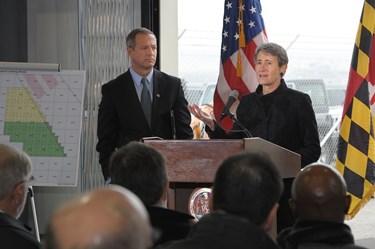Water Concerns Prompt Federal Fracking Crackdown

The Obama administration has unveiled new rules for fracking after years of criticism that it had not done enough to safeguard the water supply from this oil and gas industry practice.
"The new [Interior Department] rules require oil and gas companies to disclose all the chemicals used while fracking on protectedlands," ThinkProgress reported. In addition, "companies will be prohibited from storing fracking wastewater in open pits on national public land and required to periodically test the integrity of every well to help prevent pollution."
Administration officials framed the announcement as a common-sense regulatory update. “Current federal well-drilling regulations are more than 30 years old, and they simply have not kept pace with the technical complexities of today’s hydraulic fracturing operations,” Interior Secretary Sally Jewell said, the New York Times reported.
The new rules apply to the 100,000 oil and gas wells on public lands. That accounts for "11% of the natural gas and 5% of the oil the U.S. consumes, according to Interior Department data. Drilling on private or state-owned land won’t be subject to the regulations," the Wall Street Journal reported. Private and state-owned lands fall under state jurisdiction.
Do the rules matter? Yes, according to the Journal. "The rules are significant because they represent the standard the federal government expects state regulators and private companies to meet, if not exceed. Analysts say the regulation is likely to guide states as they update their own rules or create new ones. The federal government is actually behind most major energy-producing states, such as Colorado and Wyoming, in setting regulations," the Journal reported.
The Obama administration encouraged states to set similar standards. "Administration officials hope that the federal rules will serve as a de facto standard for state legislatures grappling with their own regulations," the Times reported.
"There are a number of states where these may be the only regulations they have," Jewell said. The burden of creating additional rules "must now be taken up in statehouses and boardrooms across the country."
One of the most controversial aspects of the rules: They will force companies to disclose the contents of the "fracking cocktail" injected into the earth during the drilling process.
"Companies will have to disclose the chemicals they injected into wells to the [Interior Department's] Bureau of Land Management after all operations are complete," Pacific Standard reported.
Details about the cocktail have rarely ever been disclosed, and critics say its contents could be alarmingly hazardous to the water supply.
"The exact fracking fluid cocktail is kept secret, although it can range over some 750 secret ingredients, such as coffee grounds or methanol. Each well requires some 7.5 million to 26.5 million liters of water for the fracking operation itself. Such tainted water has been found outside the Marcellus shale zone deep underground, although still more than a kilometer beneath groundwater supplies. And shallow wells fracked in other regions, such as West Virginia and Wyoming, have contaminated the groundwater," Scientific American reported.
The rules immediately prompted a backlash from the energy industry and Republicans in Congress, who "introduced legislation to block them from taking effect," Politico reported.
The Independent Petroleum Association of America (IPAA) and Western Energy Alliance filed a lawsuit against the federal government. Opponents stressed the potential economic impact of the rules.
“These new mandates on hydraulic fracturing by the federal government...are the complete opposite of common-sense. At a time when the oil and natural gas industry faces incredible cost uncertainties, these so-called baseline standards will threaten America’s economic upturn, while further deterring energy development on federal lands," said Barry Russell, President and CEO of the Independent Petroleum Association of America, per a statement.
Here is what the Journal said about the potential economic impact of the rules: "For smaller companies scraping by with low prices, the costs of complying with more rules could add to their woes. But many of the larger companies have already implemented similar practices and likely won’t feel much of a pinch. The regulation is unlikely to have a demonstrable impact on gasoline prices at the pump."
Certain state officials are also working to have the rules peeled back. Wyoming filed a lawsuit, and North Dakota is seeking to join.
"In the suit, Wyoming claims that the [Bureau of Land Management] cannot put these restrictions on fracking because the Environmental Protection Agency (EPA) has 'exclusive authority' to regulate any underground injections under the Safe Water Drinking Act of 1974," ThinkProgress reported.
The oil and gas industry maintains the safety of fracking. Some research suggests that fracking can be done without threatening the water supply.
The new rules were in development for years. The department "began drafting the rules, focused on drilling safety, in Mr. Obama’s first term after [technology breakthroughs] led to a surge in the production of oil and gas," the Times reported.
For more energy-industry news, visit Water Online's Produced Water Solution Center.
Image credit: "Offshore Wind Energy Announcement," Maryland GovPics © 2013, used under an Attribution 2.0 Generic license: http://creativecommons.org/licenses/by/2.0
Copyright © 1996 - 2015, VertMarkets, Inc. All rights reserved. To subscribe or visit go to: http://www.pollutiononline.com
http://www.pollutiononline.com/doc/water-concerns-federal-fracking-crackdown-0001